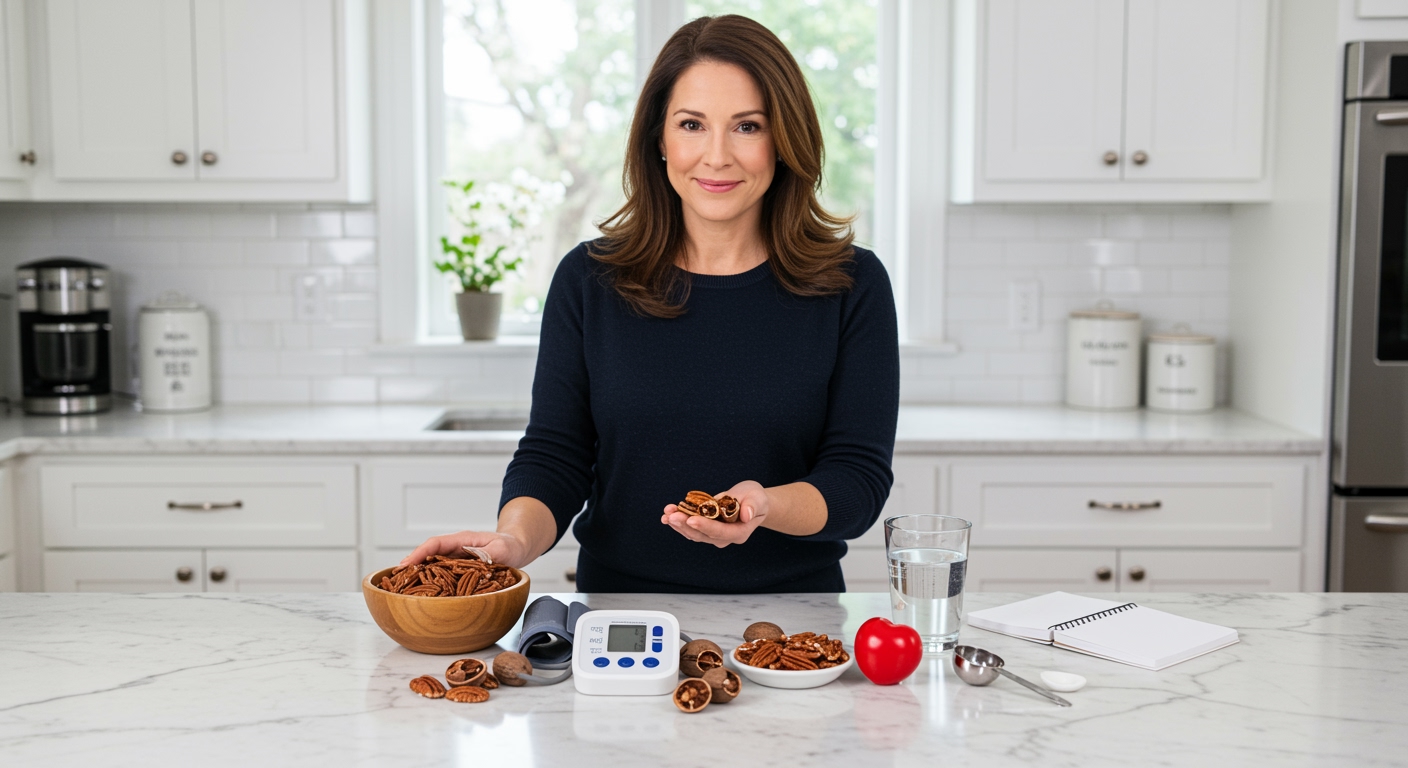✪ Key Takeaway: Pecans can help lower blood pressure through magnesium, healthy fats, and antioxidants that support cardiovascular function.
Introduction
Your doctor just told you that your blood pressure numbers are climbing into dangerous territory.
You might be wondering if there are natural foods that can help bring those numbers down without relying solely on medications.
Hi, I’m Abdur, your nutrition coach and today I’m going to explain how pecan nuts can become a powerful ally in your fight against high blood pressure.
What Makes Pecans Special for Blood Pressure?
Pecans contain a unique combination of nutrients that work together to support healthy blood pressure levels.
The magnesium content in pecans plays a crucial role in relaxing blood vessel walls.
When your blood vessels relax, blood flows more easily through them, reducing the pressure against arterial walls.
One ounce of pecans provides about 34 milligrams of magnesium, which is roughly 8% of your daily needs.
The monounsaturated fats in pecans also contribute to cardiovascular health by improving the flexibility of blood vessel walls.
These healthy fats help reduce inflammation in your circulatory system, which can contribute to lower blood pressure readings over time.
Additionally, pecans contain antioxidants like vitamin E and flavonoids that protect your blood vessels from oxidative damage.
✪ Fact: Pecans contain more antioxidants than most other tree nuts, making them particularly beneficial for heart health.
How Much Should You Eat Daily?
The optimal amount of pecans for blood pressure benefits is about one ounce per day, which equals roughly 15 pecan halves.
This serving size provides the right balance of beneficial nutrients without adding excessive calories to your diet.
Research suggests that consuming this amount regularly can lead to measurable improvements in systolic blood pressure within 4-8 weeks.
You can eat them as a mid-morning snack, add them to your breakfast oatmeal, or include them in salads for lunch.
The key is consistency rather than eating large amounts occasionally.
Your body needs time to build up the beneficial compounds and see lasting changes in blood pressure readings.
Remember that pecans are calorie-dense, with about 196 calories per ounce, so portion control remains important for overall health.
✪ Pro Tip: Pre-portion your daily pecan serving in small containers to avoid overeating this calorie-dense nut.
What Does the Research Actually Show?
Several studies have examined the relationship between pecan consumption and blood pressure improvements.
A study published in the Journal of Nutrition found that people who ate pecans regularly showed significant reductions in both systolic and diastolic blood pressure readings.
The participants consumed about 1.5 ounces of pecans daily for eight weeks and experienced an average decrease of 5-7 mmHg in systolic pressure.
Another research project demonstrated that the antioxidant activity in pecans increased by 12% in participants’ blood after regular consumption.
This increased antioxidant activity directly correlates with improved blood vessel function and reduced arterial stiffness.
The research also shows that pecans help improve the ratio of good to bad cholesterol, which indirectly supports healthy blood pressure levels.
However, these studies typically involved people who made pecans part of an overall heart-healthy diet rather than simply adding them to an otherwise poor eating pattern.
✪ Note: Most studies showing blood pressure benefits used raw or lightly roasted pecans, not heavily salted or sweetened varieties.
Are There Any Risks or Side Effects?
Pecans are generally safe for most people, but there are some important considerations to keep in mind.
People with tree nut allergies should obviously avoid pecans completely, as they can trigger severe allergic reactions.
The high calorie content means that eating too many pecans can lead to unwanted weight gain, which actually increases blood pressure.
Some people experience digestive discomfort when they suddenly increase their nut intake, so start with smaller portions and gradually increase.
If you take blood pressure medications, adding pecans to your diet might enhance the blood pressure lowering effects.
While this sounds good, it could potentially cause your blood pressure to drop too low, leading to dizziness or fainting.
Always discuss dietary changes with your healthcare provider, especially if you take medications for cardiovascular conditions.
✪ Pro Tip: Monitor your blood pressure regularly when adding pecans to track how your body responds to this dietary change.
How Do Pecans Compare to Blood Pressure Medications?
Pecans should never be considered a replacement for prescribed blood pressure medications.
While pecans can provide meaningful support for blood pressure management, medications typically produce much more dramatic and immediate results.
Think of pecans as a complementary approach that works alongside your prescribed treatment plan.
The advantage of pecans is that they provide additional health benefits beyond blood pressure, including improved cholesterol levels and reduced inflammation.
Medications often come with side effects, while pecans generally enhance your overall nutritional status when eaten in appropriate amounts.
Some people find that incorporating pecans and other heart-healthy foods allows their doctors to reduce medication dosages over time.
However, any changes to your medication regimen should only happen under medical supervision with regular monitoring of your blood pressure readings.
✪ Note: Never stop taking prescribed blood pressure medications without consulting your healthcare provider first.
The Bottom Line
Pecans can definitely help lower blood pressure through their unique combination of magnesium, healthy fats, and antioxidants that support cardiovascular function.
Small daily choices like eating a handful of pecans can create significant long-term changes in your health when combined with other smart lifestyle decisions.
I would love to hear about your experience with pecans or any questions you might have about using food as medicine for blood pressure management in the comments below.
References
At NutritionCrown, we use quality and credible sources to ensure our content is accurate and trustworthy. Below are the sources referenced in creating this article:
- PubMed: Effects of pecan consumption on cardiovascular disease risk factors
- American Heart Association: Pecan consumption and blood pressure reduction
- Oxford Academic: Tree nuts and cardiovascular health outcomes
- WebMD: Health Benefits of Pecans





